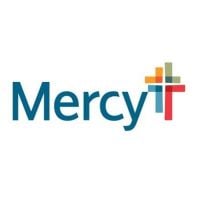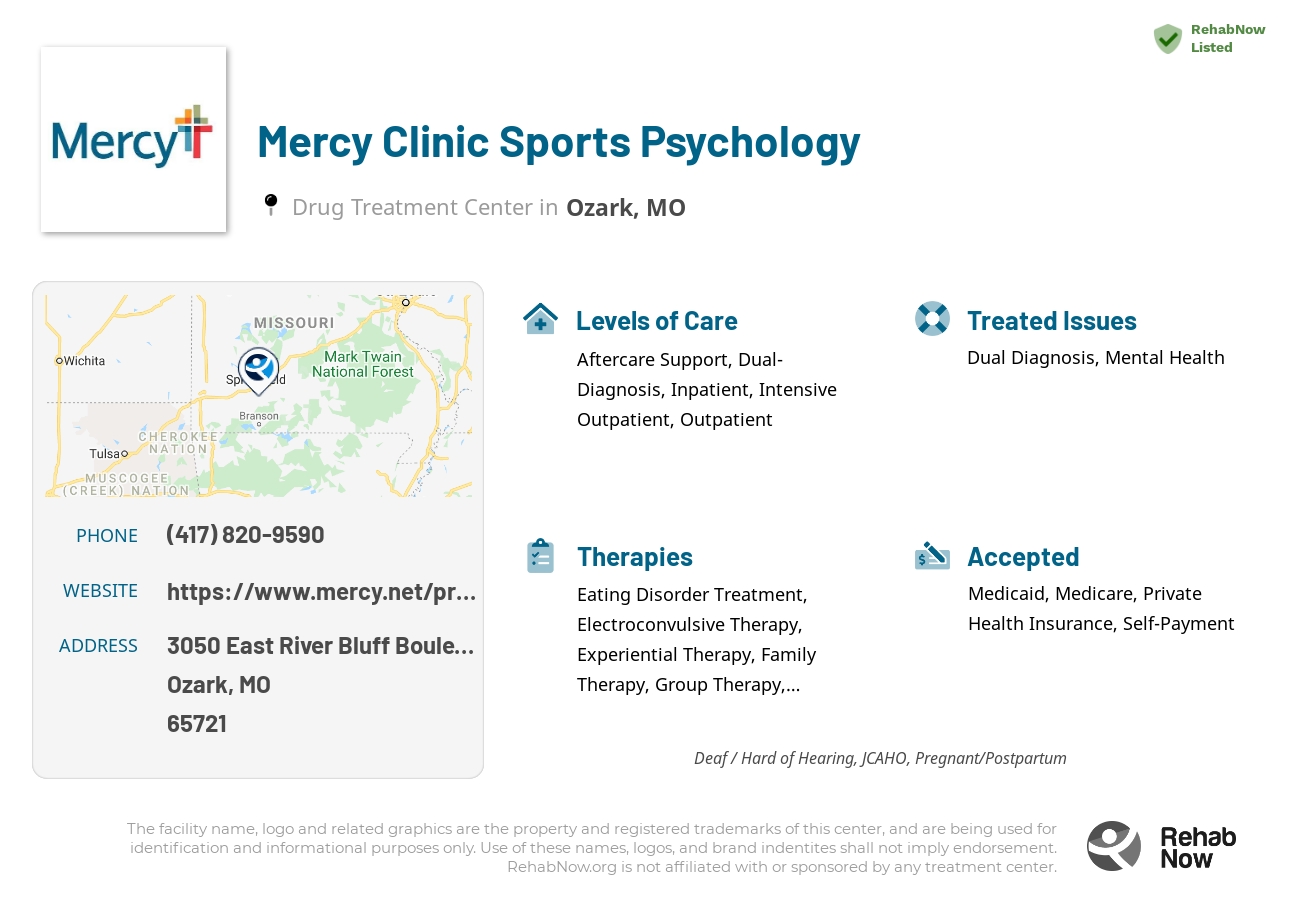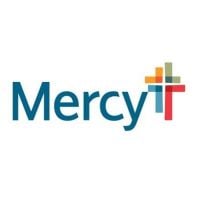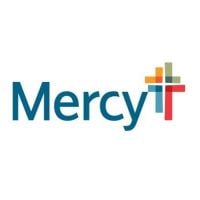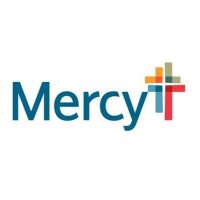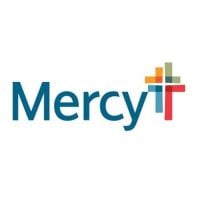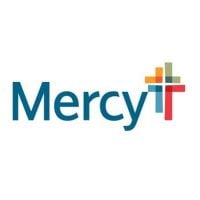Mercy Clinic Sports Psychology
Drug Rehab Center in Ozark, Missouri
Mercy Clinic Sports Psychology in Ozark, Missouri is a reputable treatment facility offering a comprehensive range of services for individuals struggling with Dual Diagnosis, Eating Disorder, Mental Health, Alcoholism, Substance Abuse, Opioid Addiction, and Drug Addiction.
About Mercy Clinic Sports Psychology in Missouri
Mercy Clinic Sports Psychology is a reputable treatment facility located in Ozark, Missouri. Accredited by the Joint Commission on Accreditation of Healthcare Organizations (JCAHO), this facility offers a comprehensive range of services to individuals suffering from Dual Diagnosis, Eating Disorder, Mental Health, Alcoholism, Substance Abuse, Opioid Addiction, and Drug Addiction. With various levels of care, including Inpatient, Intensive Outpatient, Outpatient, and Detox, Mercy Clinic Sports Psychology aims to meet the diverse needs of its patients. Additionally, they provide essential aftercare support to ensure continued recovery.
With a focus on addiction and substance abuse, Mercy Clinic Sports Psychology caters to individuals seeking treatment for Dual Diagnosis, Eating Disorder, Mental Health, Alcoholism, Substance Abuse, Opioid Addiction, and Drug Addiction. Their range of services encompasses Inpatient, Intensive Outpatient, Outpatient, and Detox programs, offering a comprehensive approach to recovery. With the goal of providing holistic support, Mercy Clinic Sports Psychology also emphasizes the importance of aftercare to ensure long-term sobriety. Through their commitment to evidence-based treatment methods and personalized care, Mercy Clinic Sports Psychology strives to help individuals overcome addiction and regain control of their lives.
Genders
Ages
Modality
Additional
Accreditations

JCAHO
Conditions and Issues Treated
Dual-Diagnosis
When someone in struggles with both addiction and mental or emotional illness, this is considered a dual diagnosis. Dual diagnosis treatment can include therapy for these issues to happen simultaneously, which will allow either of them to be treated effectively.
Sometimes people who have suffered from addiction disorder also suffer from co-occurring disorders such as depression, anxiety, bipolar disorder, etc., making them “dual diagnoses.” Dual diagnoses require specialized treatment programs where drug and alcohol addiction are addressed along with psychiatric illnesses. Some rehabilitation facilities provide patients suffering from cooccurrences a program with highly integrated services and a clean environment with few distractions to help them succeed.
Levels of Care Offered
This center offers a variety of custom treatment tailored to individual recovery. Currently available are Aftercare Support, Dual-Diagnosis, Inpatient, Intensive Outpatient, Outpatient, with additional therapies available as listed below.
Inpatient Treatment Program
Inpatient treatment for alcoholism or drug addiction is an option that provides the addict with a supportive environment in which they can stop using. After detox, an inpatient treatment center provides a structured environment for the addict to recover from their addiction and begin taking steps toward a lifetime of sobriety.
This type of treatment is appropriate for addicts that are most in need of intensive care and supervision. This includes those who were unable to quit on their own, those who need more structure than they can get in outpatient treatment, and those whose addiction has led them into legal trouble or severe health problems.
Intensive Outpatient (IOP)
The Intensive Outpatient Program offered by Mercy Clinic Sports Psychology is designed for those who need intensive care but would rather get it in the comfort of their own home. The treatment programs vary in duration and intensity and can be tailored to suit the patient’s needs. The program includes regular visits to the facility, though the overnight stay is not needed. IOP is suitable for patients who have been treated in residential treatment programs and are in the transition phase. It helps the patient live at home and discharge some work or school responsibilities even while undergoing treatment. The patients gradually get back to their routine life with the support of a friend or family member.
Outpatient Program
Outpatient treatment is often used for drug addicts in drug rehab. Outpatient treatment consists of counseling and therapy sessions. This form of treatment is also called ‘day-treatment’. The outpatient treatment process begins with the addict’s initial detox period, lasting about ten days.
Outpatient treatment is used for those who are at moderate risk for ‘slipping back’ into the addiction, for those who:
- Are not currently experiencing any side effects from withdrawal and can handle social pressure
- Can handle stressors that might trigger relapse
- Have a stable living environment or have moved out of their previous environment, which was not conducive to being sober
- Have a support system that allows them to go to a facility a few times a week while still keeping their current responsibilities
- Have no legal obligations, being either on parole or probation, that require them to seek treatment at a mandatory facility
- Are not currently experiencing any side effects from withdrawal and can handle social pressure
- Have a stable living environment or have moved out of their previous environment, which was not conducive to being sober
Completing a drug or alcohol rehab program is only the first step. Then comes aftercare support. These services include sober living accommodations, career counseling, and AA/NA programs for those struggling with sobriety or who want help maintaining it after initial rehab at an addiction facility.
They can last up to a year or more depending on what’s needed most urgently after the earlier stages are completed.
Therapies & Programs
Individual Therapy
Because no single treatment is effective for all addicts, the goal of treatment and therapy should be to figure out what works best for each individual. Tolerance and withdrawal levels differ from person to person, affecting the treatment intensity required. Addiction treatment should aim to help addicts develop healthy coping mechanisms for dealing with their addiction and its underlying causes.
Family Counseling
Family therapy is beneficial for people who are in addiction treatment services because it offers addicts the opportunity to work with their family members to better understand what led them to make choices that contributed to their addiction.
This type of therapy helps family members reach a deeper understanding of how they can best support their loved one during recovery. It also helps the addict better understand their own motivations and triggers that led them to turn to substance abuse.
Family therapy can help addicts in the following ways:
- Assists family members in processing difficult feelings so they don’t blame or resent recovering addicts
- Assists family members in understanding how addiction has impacted the addict and everyone who is involved with them
- Allows the addict to take responsibility for their actions, while encouraging improved communication skills
- Helps family members understand how to best support an individual in recovery so addicts don’t relapse again.
Group therapy can help build a stronger support system and give addicts in Ozark, MO insight into their addiction that they gain through shared conversations. Group therapy occurs in a controlled group environment, exclusive of one on one meetings. This makes it safer for patients to feel comfortable sharing the struggles they’re going through and gaining perspective.
Trauma therapy is beneficial for people who are recovering from drug addiction because it helps them heal from past traumas that may have caused them to turn to harmful substances or led them to experience negative emotions that contributed to their destructive behaviors.
This type of treatment works by processing difficult experiences so individuals can learn how to process these events without having to turn to substances for coping.
Trauma therapy can help addicts in the following ways:
- Helps individuals understand their experiences and emotional responses to difficult events, including why they turned to drugs or alcohol
- Provides them with comfort and support while working through difficult emotions related to these traumatic experiences
- Offers an opportunity for addicts to have a voice and be heard, which can improve their self-esteem
- Can help them develop coping skills so they can better respond to triggers instead of turning to substance abuse.
Addicts seeking sobriety can find quick results with Rational Emotional Behavior Therapy. This type of counseling offered by Mercy Clinic Sports Psychology replaces negative and self-limiting thoughts with positive and productive behaviors. This allows addicts to move forward without having to deal with ongoing treatment throughout their lives. Individuals who are seeking sobriety can find quick results with Rational Emotional Behavior Therapy.
It’s important to remember that malnutrition can affect your mood and energy level, which affects your desire to get sober. Good nutrition helps keep your body strong against the familiar ravages of drug use–tuberculosis, hepatitis, abscesses, infections, etc. — as well as the physical symptoms of withdrawal. If you’re eating right, you’ll have more energy for productive activities and will have more strength to fight cravings.
Patient Experience
Experiential Therapy at Mercy Clinic Sports Psychology
Experiential therapy uses engaging activities to help patients access deeper, often hidden emotions. For example, the patient could role-play a problematic situation or engage in activities like drawing, painting, poetry writing, music composition, exercising, or journaling to help process intense feelings.
Experiential therapy is a type of therapeutic approach that focuses on having patients work through problems, issues, or emotions by engaging directly in some real experience. Experiential therapy occurs face-to-face with a therapist who helps these people to explore their feelings first hand.
It is based on the belief that to truly understand and gain insight into oneself and behavior; it is necessary and helpful to have real experiences with the issues involved. Some therapists have developed the experiential therapy approach as a way of treating addictive behaviors or dealing with impulses related to addiction. It comes from an existential school of psychotherapy called ‘experiential existential.’
Payment Options Accepted
For specific insurance or payment methods please contact us.
Is your insurance accepted?
Ask an expert, call (888) 674-0062
Mercy Behavioral Health Associated Centers
Discover treatment facilities under the same provider.
- Mercy Hospital - Behavioral Health in Saint Louis, MO
- Mercy Behavioral Health - Washington in Washington, MO
- Mercy Clinic Psychiatry - Festus in Festus, MO
- Mercy Behavioral Health - Springfield in Springfield, MO
- Mercy Clinic Behavioral Health - Lebanon in Lebanon, MO
Learn More About Mercy Behavioral Health Centers
Additional Details
Specifics, location, and helpful extra information.
Ozark, Missouri 65721 Phone Number(417) 820-9590 Meta DetailsUpdated November 25, 2023
Staff Verified
Mercy Clinic Sports Psychology Patient Reviews
There are no reviews yet. Be the first one to write one.
Ozark, Missouri Addiction Information
Opioid-related overdoses in Missouri have been increasing steadily for the past three decades. In 2018, more than 1,130 people in Missouri died from opioid abuse. Methamphetamines and marijuana abuse have surpassed opioid abuse in Missouri. Missouri is the number 1 methamphetamine manufacturer in the country with more than 27 meth labs per 100,000 people.
Treatment in Nearby Cities
- Piedmont, MO (140.1 mi.)
- Mountain Grove, MO (53.6 mi.)
- Saint James, MO (108.4 mi.)
- Poplar Bluff, MO (158.9 mi.)
- Fenton, MO (181.2 mi.)
Centers near Mercy Clinic Sports Psychology
The facility name, logo and brand are the property and registered trademarks of Mercy Clinic Sports Psychology, and are being used for identification and informational purposes only. Use of these names, logos and brands shall not imply endorsement. RehabNow.org is not affiliated with or sponsored by Mercy Clinic Sports Psychology.
